- Home
- William H. Keith
Jackers
Jackers Read online
WARSTRIDER
JACKERS — 03
WILLIAM H. KEITH, JR.
AVON BOOKS • NEW YORK
If you purchased this book without a cover, you should be aware that this book is stolen property. It was reported as “unsold and destroyed” to the publisher, and neither the author nor the publisher has received any payment for this “stripped book.”
WARSTRIDER: JACKERS is an original publication of Avon Books. This work has never before appeared in book form. This work is a novel. Any similarity to actual persons or events is purely coincidental.
AVON BOOKS
A division of
The Hearst Corporation
1350 Avenue of the Americas
New York, New York 10019
Copyright © 1994 by William H. Keith, Jr.
Cover art by Dorian Vallejo
Published by arrangement with the author
Library of Congress Catalog Card Number: 94-94313
ISBN: 0-380-77591-3
All rights reserved, which includes the right to reproduce this book or portions thereof in any form whatsoever except as provided by the U.S. Copyright Law. For information address The Ethan Ellenberg Literary Agency, 548 Broadway, #5-E, New York, New York 10012.
First AvoNova Printing: November 1994
AVONOVA TRADEMARK REG. U.S. PAT. OFF. AND IN OTHER COUNTRIES. MARCA REGISTRADA. HECHO EN U.S.A.
Printed in the U.S.A.
RA 10 9 8 7 6 5 4 3 2 1
Contents
Prologue
Chapter 1
Chapter 2
Chapter 3
Chapter 4
Chapter 5
Chapter 6
Chapter 7
Chapter 8
Chapter 9
Chapter 10
Chapter 11
Chapter 12
Chapter 13
Chapter 14
Chapter 15
Chapter 16
Chapter 17
Chapter 18
Chapter 19
Chapter 20
Chapter 21
Chapter 22
Chapter 23
Chapter 24
Chapter 25
Chapter 26
Chapter 27
Chapter 28
Epilogue
TERMINOLOGY AND GLOSSARY
Japanese Words and Phrases
Prologue
It was the celebration of the new year, the first day of the month of Sho-gatsu, and the celebrations were in full swing throughout the vast, slow-turning wheel that was Tenno Kyuden, the Palace of Heaven. His Divine Majesty, the Emperor of Man, had left the parties and ceremonials early, however, retiring to his private quarters. Now, he floated alone in space, the stars of the Shichiju scattered about him, colored motes in emptiness. That vista of suns adrift against the fog-glowing band of the Milky Way was illusion, of course, a ViReality given form and texture by the AIs that governed the palace, but the Emperor found it a useful one, a way of putting into perspective his own relative unimportance against the sweep and glory of the galactic backdrop.
There were many among his subjects who thought of the Emperor as a god… though Shiginori Konoye the man was all too aware of his own frailty. In the eighty-fifth year of his reign, which he had called Fushi, an era-name meaning Immortality, he was 181 Terran Standard years old. With medical nangineering and the antisenescence meteffectors coursing through his veins, cleaning, rebuilding, and repairing, there was theoretically no limit to the years of additional life he could expect. Expecting, however, was one thing. Wanting was something else.
Shiginori Konoye was tired.
With most of his life passing here within the Imperial Court at Tenno Kyuden, the synchorbital Palace of Heaven perched atop the Singapore Sky-el, Shiginori had been raised from childhood in the understanding that government was Imperial Nihon’s duty and burden in the great tapestry of the cosmos.
When the West had abandoned space travel five centuries earlier, a Nihon barely recovered from the ravages of war had stepped in, picked up the standard of Man’s ascent to space, and carried it on. Within fifty years, the economic strength rising from orbital factories and Lunar mines, not to mention the strategic advantages bestowed by orbital battle stations and laser platforms, had made Nihon the dominant power on the planet, a superpower easily able to assert control over Earth’s impoverished, warring nations.
The result had been the Terran Hegemony, fifty-seven nations joined together within the benevolent embrace of the Teikokuno Heiwa, the Imperial Peace. And when the K-T drive opened the worlds of other stars to terraforming and exploitation, the colonies of dozens of those nation-states had of course been added to the Hegemony. The Shichiju—the name meant “the Seventy” and was a little out of date for that reason—now embraced seventy-eight inhabited worlds in seventy-two star systems, these motes drifting now just beyond the silken hem of Shiginori’s haori.
If the rule of Nihon over the Hegemony seemed only right and natural to Shiginori, so, too, did the Hegemony’s acceptance of that rule. It was for that reason that the Emperor of Man had been so surprised at the sharp and sudden flame of rebellion.
It was beyond understanding, really. Rising tensions, the appearance of agitators and rioting mobs on worlds as far removed as New America and Rainbow, had preceded the creation of something called the Network, a rebel underground dedicated, it seemed, to tearing the Hegemony asunder. The latest reports suggested that at least five worlds of the Shichiju, and possibly many more, were about to join together in a confederacy, with Network organizers forming the new government. At the same time, riots and protests had exploded at last into open conflict; the first battle of civil war had already been fought, at a world called Eridu some twenty-five light-years from Earth.
Nairan—civil war. The very concept was unthinkable in a regime that had ruled in peace for centuries.
The problem, the Emperor thought, lay in the differences between the Nihonjin, the Japanese people, and the gaijin, the foreigners they governed. Raised with the twin concepts of Kodo, the Imperial Way, and on, their moral obligation to emperor and parents, the Japanese possessed an inner discipline that foreigners did not.
The stars, the blackness of space itself, dissolved around the Emperor. Startled, he looked around. He’d issued no mental command, and yet the virtual reality projected within his mind had changed. Trees, grass, cobblestone paths, and familiar buildings materialized around him, and he felt again the tug of gravity. He recognized this place, though he’d walked its gardens only a few times, during rare trips back to Earth. This was the shrine of Tsurugaoka at Kamakura, a holy place dedicated to Hachiman, God of War.
Concentrating, he issued orders through his cephlink, attempting to end the simulation, to break linkage, but nothing happened. Taking an unsteady step backward, he felt the rough bark of a gnarled and ancient ginkgo tree press against his spine. The scent of cherry blossoms filled his nostrils.
“What is the meaning of this?” he called. Someone must be monitoring this ViRscene, must be listening to his words. Who?
He thought he already knew why.…
“Tenno-heika” a voice said beside him. “Your Imperial Majesty.…”
Turning to his left he saw Gensui Tadashi Ikeda standing a few meters away in his spotless, Imperial Navy dress whites. The Fleet Admiral bowed deeply, and when he raised his eyes again, his gaze went no higher than the Emperor’s throat.
“Ah, Ikedasan” the Emperor said slowly. “I would be interested in knowing how you managed to override my personal AI.”
“Such things can be accomplished, Your Majesty, when there is great need. As now.”
Again, the Emperor tried to disconnect. This scene was not real. It was ViRdrama, a dream played
out inside his brain by the software of a sophisticated artificial intelligence. His body lay safe in the Palace of Heaven, secure within its duralloy crypt. All he had to do was wake up.…
But he could not. “What is it you want?”
“I am sure you can guess, Your Majesty. I am most sorry.”
“So. Is the condemned man to know the reason for his execution? For his assassination?”
Again, Ikeda bowed. “That is why I am here, Your Majesty.”
“Munimori sent you, I suppose.”
“Gensui Munimori and I drew lots. This honor fell to me, though I am unworthy.”
“Indeed.” The Emperor waited, expressionless, forcing his assassin to volunteer the information rather than losing face by asking. His expression was that of shiran kao, the nonchalant face, revealing nothing.
“I speak for the Kansei no Otoko” Ikeda said. “The Men of Completion. They feel that your policies of admitting gaijin to the Imperial Navy, to the Imperial Council itself, have done terrible harm to the Empire and are in part responsible for our defeat at Eridu. Worse, you do not comport yourself as… as a god should.”
The accusation forced a smile from the Emperor, despite his shiran kao. The Japanese idea of a “god” was vastly different from that of most Westerners; most Japanese still thought of their parents as “gods” and revered the emperor as a similar god, one slightly higher in the celestial hierarchy.
But a few, the Men of Completion among them, took the idea that the emperor was descended from the Sun Goddess Ameratsu far more seriously.
Did that seriousness actually extend to the murder of the god they claimed to revere?
He took a breath to reply… and found his breathing blocked, as though an invisible, silken cord had tightened around his throat. “Tawakeru na,” he managed to say. “Stop playing the fool!” The cord tightened, the pressure building though it did not bite into his skin. Pain was growing in his chest as well, a burning, crushing pain that arced down his left arm.
Pain! Normally, purely physical sensations could not cross the ViReality barrier. That his link was passing them through now was a kind of emergency warning, an indication that his body was in serious danger. He tried to raise his hands, but they dangled useless at his sides. Again he accessed his cephlink, calling for help.
“Your cephlink has been isolated, Your Majesty. I control the AI now, and I have directed it to shut down your breathing and your heart. You will not suffer for long, I promise.” Ikeda paused, his image licking its lips. “They will find your body in the palace,” he continued. “You will have committed seppuku. Your death poem will apologize for your causing civil war and disorder in your realm.”
“Who… will… be emperor?…”
“Your nephew and heir, your Majesty. Ichiro Takeda.”
“But… he’s… not…”
“I very much regret to tell you that Prince Okada, your son and first heir, will also be found dead, by his own hand. Possibly because of grief at the news of your death.”
Iye… Denial flooded the Emperor’s mind, a pain worse than the agony in his chest. No… no… Takeda was an empty-headed idiot, a pawn in the hands of Munimori and the other plotters. Evidently, that was what the Men of Completion were counting on.
Then the Tsurugaoka shrine dissolved into darkness, and the Emperor of Man floated once more, adrift in the endless, peaceful night.
Chapter 1
To Western sensibilities, the tea ceremony is alien, flat, and lifeless. To Nihonjin, however, each motion, each aspect is charged with subtle meaning, providing aesthetic stimulation, refreshment, and the well-being and security of time-honored ritual. Here, surely, is the soul of Zen, understatement speaking directly to the mind.
—Japan: From the Past to Tomorrow
Frank Harrison
C.E. 2045
All of Earth was in mourning for Tenno-heika, the Fushi Emperor, the Emperor of Man. His body had been returned down the Singapore Sky-el, then placed in funeral procession aboard the Imperial hydrofoil yacht Manaduru for the voyage across the South China Sea and final cremation according to Shinto rite at the Imperial shrine at Kyoto.
If there was irony that the Fushi Emperor was dead—after all his nengo, or era-name, meant Immortality—none cared to comment openly. Even nation-states of the Hegemony that did not accept the godhood of the man occupying the Chrysanthemum Throne recognized that they had lost a friend and advocate, for the twin suicides of Konoye and his only son, his first heir, all but guaranteed that the recent trend toward including non-Japanese in Imperial affairs would quickly cease.
The Fushi Emperor’s successor ascended to the Chrysanthemum Throne within the Tenno Kyuden on the fourth day of Sho-gatsu, the first month of the Common Era year 2543. Ichiro Takeda had already chosen Tenrai for his era-name, a poetic form meaning Heavenly Thunder. There was sharp symbolism in the choice; where the Fushi Emperor had striven for long-lasting stability, for the immortality of Empire and Emperor alike, the Tenrai Emperor would proclaim once again the power of heaven above the Earth and all the widely scattered family of Man. Tenno-heika Tenrai would be more god than man, elevated above the affairs of mortals, as befitted his station.
And he would be the warning thunder that would bring the squabbling enemies of the Imperial peace to heel.
The Nihongo word gensui, meaning Fleet Admiral, was both rank and title. Gensui Yasuhiro Munimori, commander of the Imperial First Fleet and Chief of the Emperor’s Personal Military Staff, nodded politely, a restrained formal response to his visitor’s bow. Munimori was a large and imposing man, his torso layered with slabs of fat and muscle that reminded Chujo Tetsu Kawashima of the man-mountain bulk of a sumo wrestler.
Approaching the Fleet Admiral, Kawashima thought, was much like seeking audience with a mountain, and often as productive. Munimori was a man who set his own course, who told others what he expected of them, and who rarely changed his mind simply because others of lesser rank dared to contradict him. Such contradictions were increasingly rare these days, for with his accession to Imperial Chief of Staff, there were few who could challenge his political position, and fewer still who would.
Vice Admiral Kawashima had been an Imperial Navy officer for nearly forty years, had reached his current position of Fleet Squadron Commander after serving four years as commander of a Fleet Carrier Group. He resented the rapid rise of younger men like Munimori, who’d been a junior tai-i, a navy lieutenant, back when Kawashima had been commanding his first ship, and he mistrusted their ambition. Still, with Kawashima now commanding the First Fleet’s Ohka, or Cherry Blossom Squadron, Munimori was Kawashima’s direct superior, and duty, honor, and the ancient demands of bushido all required unquestioning obedience.
“Konichiwa, Kawashimasan,” Munimori said, his voice a rumble from somewhere deep within his vast belly. A hand gesture dismissed the genegineered female servant who’d ushered Kawashima through the door. “Welcome to my home.”
“Konichiwa, Gensuisama. I am most honored.”
“Please, come. I have ordered o-cha for us.”
Kawashima knew that Munimori had orders for him but had no idea what they might be. He’d certainly not been expecting an invitation to the Fleet Admiral’s private residence within the Tenno Kyuden wheel. As he glanced about the anteroom, he was struck by the modest and restrained taste of his host, by the decor that a gaijin might call Minimalist. The Nihongo word for it was shibui, a word that meant the astringent pucker to the mouth caused by just-ripened persimmons. Bare walls, patterned after the quiet beauty of the lattice and paper shoji of a traditional house, woven tatami on the floors, gentle lighting from no visible source, these were the surroundings of a well-to-do merchant, perhaps, not a daimyo of the Empire. The only visible indicators of true wealth were the servants—humans rather than robots, and the women showing the too-perfect beauty of genegineered ningyo.
Munimori must want something exceptional, Kawashima thought as he followed the big man d
eeper into the warrens of his private residence. He had never known the Fleet Admiral to show such generosity to anyone save, possibly, to the highest ranking daimyos of the Imperial government.
Most of the senior Imperial military officers maintained quarters here within the slowly rotating Palace of Heaven, close by the Chrysanthemum Throne itself. Munimori’s residence was located at the one-sixth-G level of the Tenno Kyuden wheel, and the lesser gravity—about what one would experience on the Moon—obviously was to his liking. He moved with an oddly graceful, sliding walk that carried his mass with surprising speed along the smooth, slightly curving floors, and Kawashima had to hurry—carefully for fear of falling and losing face—to keep up. He doubted that the big man would be able to stand in a full gravity.
They stopped in an austerely spartan room—but not the one reserved for the tea ceremony. There were no furnishings at all save a tatami on the floor, an antique sword rack, and a peculiar, twisting inochi-zo by itself in a small alcove.
“Please wait here,” his host commanded, and Kawashima was left alone.
He was drawn at once to the inochi-zo, a “life-statue” standing perhaps a third of a meter tall. Like some obscene plant, it grew from a pot of soil, but it appeared to be sculpted of living flesh, an exquisitely delicate homunculus crafted by a genegineer’s art. Its overall form was that of a nude man, but the limbs bent and folded about its artistically twisted torso, a part of the body they embraced. Lacking a head, the creature’s face had been grafted onto a broadened chest; the mouth gaped in a voiceless, breathless, and eternal scream, while the living eyes followed Kawashima’s every move.
He’d heard of such things, of course, but had never seen one, for they were quite rare and extraordinarily expensive. Though each was unique, as befitted a work of art, they reputedly fell into one of two classes, the tanoshimi-zo, which lived in continual orgasmic pleasure, and their dark counterparts, the kurushimi-zo, for which simply existence was unending agony.

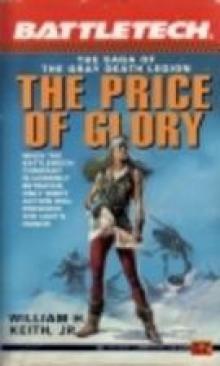 The Price of Glory
The Price of Glory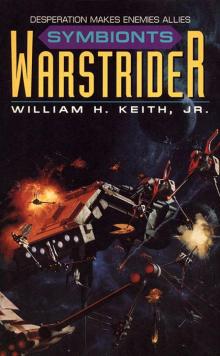 Symbionts
Symbionts Rebellion
Rebellion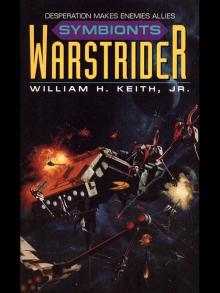 Warstrider 04 - Symbionts
Warstrider 04 - Symbionts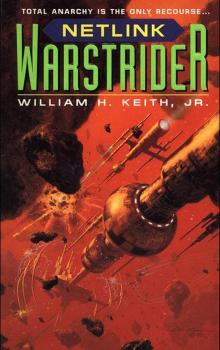 Netlink
Netlink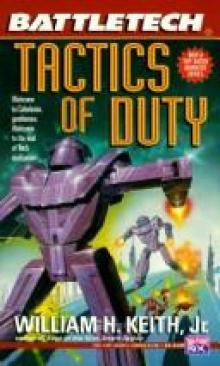 Tactics of Duty
Tactics of Duty Warstrider 06 - Battlemind
Warstrider 06 - Battlemind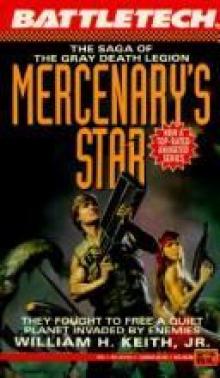 Mercenary's Star
Mercenary's Star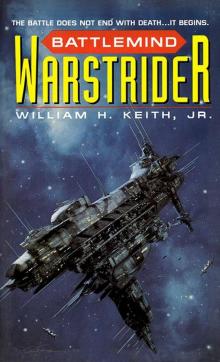 Battlemind
Battlemind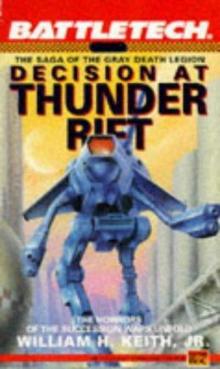 Decision at Thunder Rift
Decision at Thunder Rift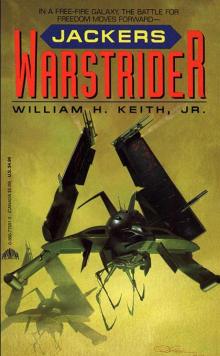 Jackers
Jackers Android: Free Fall
Android: Free Fall Warstrider 01 - Warstrider
Warstrider 01 - Warstrider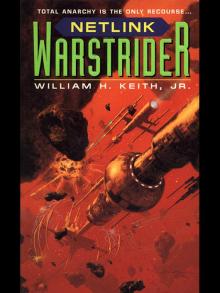 Warstrider 05 - Netlink
Warstrider 05 - Netlink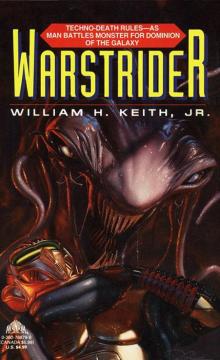 Warstrider
Warstrider